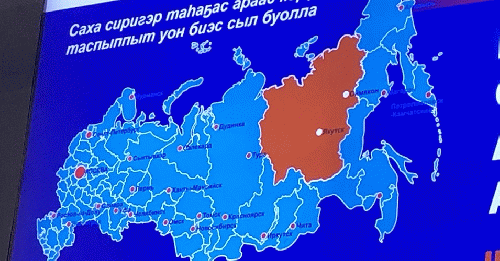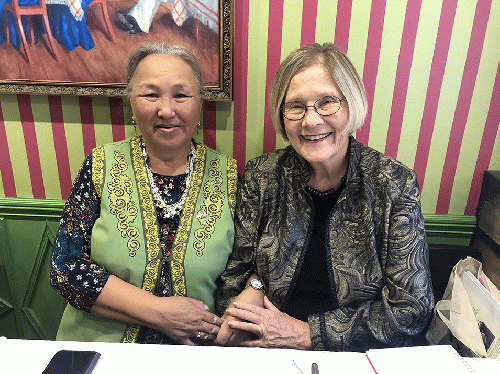Traveling to Yakutsk in Far East Russia
"Our planet is so small that we must live in peace" said the head of the organization for mothers of military veterans in Yakutsk, Siberia, Far East Russia and called for "mothers to unite against war," a sentiment that, despite the actions of our politicians and government leaders, is one of the many common threads that ordinary Russians and ordinary Americans share.
Heading to Far East Russia, I was in the Russian Far East, in the city of Yakutsk as a part of the Center for Citizens Initiatives citizen to citizen diplomacy program. The 45-person delegation from the United States had completed five days of dialogue in Moscow with Russian economic, political and security specialists about their analyses of today's Russia, formed into small teams and had disbursed to 20 cities all over Russia to meet people and learn about their lives, their hopes and their dreams.
When I got on the S7 airliner departing Moscow, I thought I must have gotten on the wrong plane. It seemed like I was headed for Bishkek, Kyrgyzstan instead of Yakutsk, Sakha, Siberia! Since I was going to Far East Russia, I had expected that the majority of passengers would be ethnic Asians of some type, not European Russians, but I didn't expect that they would look so much like ethnic Kyrgyz from in the Central Asian country of Kyrgyzstan.
And when I stepped off the plane in Yakutsk, six hours and six-time zones later, I was definitely in a time warp back 25 years to 1994 when I arrived in Kyrgyzstan for a two-year U.S. diplomatic tour.
The city of Yakutsk looked much like the city of Bishkek with the same types of Soviet-style apartment buildings, with the same above-ground pipes for heating all the buildings. And as I saw during the three days meeting people in their homes, some of the old-style Soviet-era apartment buildings have the same dimly lighted, poorly maintained stairways, but once inside apartments, the warmth and charm of the occupants would shine.
But as in all parts of Russia, the economic changes of the past 25 years following the dissolution of the Soviet Union has transformed much of the daily life of Russians. The move in the early 1990s toward capitalism with the privatization of the massive Soviet government industrial base and the opening of private small and medium-sized enterprises brought new construction in the business community as well in housing for the new middle class changing the look of cities in Russia. The import of goods, materials and food from Western Europe opened up the economy for many. However, pensioners and those in rural areas with limited income have found their lives more difficult and many wish for the days of the Soviet Union where they feel they were more secure economically with state assistance.
World War II Remembered Vividly -- Over 26 million died
The effects of World War II are still felt on Russians all over the country including the distant Russian Far East. Over 26 million citizens of the Soviet Union were killed as the German Nazis invaded. In contrast, 400,000 Americans were killed in the European and Pacific theaters of World War II. Every Soviet family was affected with family members killed and families all over the Soviet Union suffering from lack of food. Much of the patriotism in Russia today centers on remembering the huge sacrifice 75 years ago to repel the Nazi invasion and sieges and a commitment to never let another country put Russia into such a situation again.
Even though Yakutsk was six times zones and 3,000 air miles or 5400 driving miles from the western front near St. Petersburg and the eastern European countries that were under siege, the population of the Soviet Far East were mobilized to help defend the country. In the summer of the early 1940s, young men were put on boats on rivers that flowed north to the Arctic and shipped around to the front.
Meeting Veterans in Russia
Since I am a veteran of the U.S. military, my hosts arranged for me to meet with two military-related groups in Yakutsk.Maria Emelyanova is the head in Yakutsk of the Committee of Soldiers' Mothers of Russia, an organization that was created in 1991 after the return of Soviet soldiers from Afghanistan in 1989 and was very active during the First Chechen War (1994-96) when an estimated 6,000 Russian soldiers were killed and between 30,000-100,000 Chechen civilians died in the conflict.
Maria said that the brutality of the Chechen war as seen on Russian TV caused two women in Yakutsk to die of heart attacks. Forty young men from the Yakutia region were killed in Chechnya.
I asked about Russian involvement in Syria and she responded that to her knowledge no Russian ground forces are in Syria but the Air Force is there and several Russian airmen have been killed when the US sent a missile into an Air Force base in Syria. She said the death and destruction for Syria is terrible. Maria added, "Our planet is so small that we must live in peace" and called for "mothers to unite against war," which is echoed by many American groups, including Veterans for Peace and Military Families Speak Out.
Obligatory military service in Russia is one year and according to Maria, families are not against young men getting military training as it gives them discipline and better opportunities for a job after the one year of service --similar to the rationale given by many U.S. families -- and the veterans preference given for jobs in the US.
Next Page 1 | 2 | 3 | 4 | 5
(Note: You can view every article as one long page if you sign up as an Advocate Member, or higher).
Ann Wright is a 29-year US Army/Army Reserves veteran, a retired United States Army colonel and retired U.S. State Department official, known for her outspoken opposition to the Iraq War. She received the State Department Award for Heroism in 1997, after helping to evacuate several thousand (
more...)








